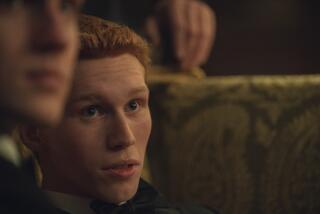The (Nazi) Party Prince, or Harry’s Wardrobe Malfunction
- Share via
It’s been a while since the word “Nazi” was associated with a member of the British royal family. But obviously it has not been long enough. Thursday, London’s best-selling newspaper, the Sun, splashed a photograph of 20-year-old Prince Harry at a costume party wearing the uniform of Nazi Field Marshal Erwin Rommel’s Afrika Korps, complete with swastika armband, and the whole of Britain went instantly berserk.
“Complete idiot” was the epithet bandied about by one anti-fascist group, and nobody seemed to think it remotely inappropriate. The president of Britain’s Holocaust Trust went even further, calling the prince’s actions “stupid and evil.” The Sun’s headline was “Harry the Nazi.”
A former armed forces minister suggested that Harry, who is third in line to the throne, was now unfit to enter Sandhurst, Britain’s elite officer training school, where he is due to start later this year. And the former commander of British forces in Bosnia, Col. Bob Stewart, said that if one of his men had gone to a party dressed as a Nazi he would have put him on toilet-cleaning duty for two weeks.
It’s hardly news that a British royal has, once again, made a prize twit of himself. That seems to be the House of Windsor’s lot. But this is in a whole different category. Even a 20-year-old (and particularly one in line to the throne) should know that the world is still colossally and understandably sensitive about the Nazis and their monstrous crimes.
After all, the Third Reich came close to ripping apart the fabric of the British monarchy in the 1930s and posed a unique threat to a divided establishment. Had history jogged just a few degrees one way or the other, Britain could have found itself either allied with Adolf Hitler or overrun by his Wehrmacht and turned into a fascist state.
Nobody represented the flirtation with totalitarianism more than Harry’s great-grand-uncle, Edward VIII, the ultimate black sheep of the family, who openly sympathized with the Nazis and might have pushed Britain into an anti-Stalinist alliance with Hitler had it not been for his insistence on marrying the American divorcee -- and equally ardent Nazi apologist -- Wallis Simpson, an insistence that precipitated his abdication in 1936.
For a long time, conventional wisdom had it that the objection to Simpson was religious and moral: that there was no tolerance of divorce in Anglican belief, which Edward, as monarch, was bound to uphold.
Recently released official papers have shown, however, that the establishment was greatly exercised by Simpson’s fondness for the Nazis (she was believed to have been Joachim von Ribbentrop’s lover when he was ambassador to London), even more vexed about Edward’s openly pro-Nazi leanings and anxious to see him stripped of the crown if at all possible. The divorce must have seemed providential.
The reverberations from the abdication crisis are still palpable among today’s royals. Three of Prince Philip’s sisters married Nazi sympathizers, and the Windsors who succeeded Edward VIII -- his brother, George VI, and George’s daughter, Elizabeth II -- had to live it down, even after the Third Reich’s demise.
Edward himself continued to be a severe embarrassment, dining in Germany with Hitler and Rudolph Hess in 1937 and very possibly (the record is ambiguous) plotting with the Nazis to return to the throne in the event of a successful invasion of Britain.
This is the history that Harry just brought roaring back to life. The costume party, held at the mansion of the Olympic show jumper Richard Meade, was on a “native and colonial” theme, so, to add insult to injury, Harry’s costume revived unpleasant parallels between the Nazi taste for bloodthirsty imperial adventure and Britain’s own leanings in that direction -- like using poison gas on the Kurds, shooting independence protesters in India and so on. Britain has long since repented of its imperial sins, but nostalgia still abounds in certain upper-class circles.
Harry has been a mild cause for concern before -- accused by his art teacher at Eton of cheating on his A-level exams, caught in a bust-up with a photographer outside a London club. With a reputation as a tearaway, he’s spent part of his year before Sandhurst working as a ranch hand in Australia. His father and grandmother must be regretting he didn’t stay longer.
More to Read
Sign up for Essential California
The most important California stories and recommendations in your inbox every morning.
You may occasionally receive promotional content from the Los Angeles Times.










